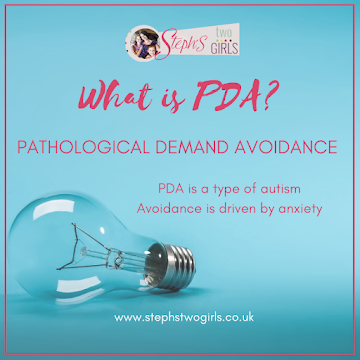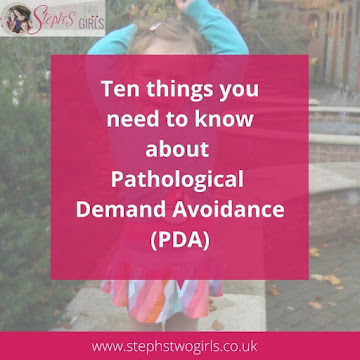For information, in case anyone still thinks autism is less common in girls, the current estimated split between boys and girls with PDA is 50/50 as opposed to the split for classic autism or Aspergers which is estimated to be 1 girl to every 4 boys.
This week's blogger wished to remain anonymous but has written a letter to other parents in the hope that she can explain more about her daughter.
---------------------------------------------------------------------------------
It's hard being the new kid at school and the new parent in the playground.
I've always considered myself a warm and welcoming person and naively expect the same in others. Often in new situations it takes confidence to build up a rapport with people you see for only a small window of time each day but after 6 months of standing alone, I guess my efforts have largely gone unnoticed or even unwelcome perhaps.
I apologise for making you feel awkward by standing near you in the hope you may catch my friendly gaze and match it with warmth. Not knowing you, I can't guess you don't want to small talk with a random parent of 'that kid'.
'That kid' who your children talk about at home is my kid. She is bright and beautiful with a generous spirit and feisty, inquisitive nature. She speaks her mind and is a strong leader with interesting ideas. She is creative and sassy with style and flair. She is all these things and more if you could just take the time to adjust your lens.
She is at present still undiagnosed by doctors although a diagnosis of PDA or high functioning autism with demand avoidance is probable. She has no physical disabilities. Physically she is healthy. Perhaps if she had disability aids such as a wheelchair or a walking frame, they might give you a clue to the challenges she faces every day. If she had a life threatening physical illness you may even sympathise or pity her unfortunate situation.
She has a communication and emotional developmental delay that doctors are unable to pinpoint. This makes her every waking hour either a challenge or a triumph and as a family we walk with her on her journey every step of the way. We support her in every imaginable way and we too struggle to comprehend the inner turmoil she faces daily.
It can make her angry, frustrated and frightened with everyday situations that you and I perhaps take for granted. Interactions for her can be debilitating in certain situations because of this she can appear moody, distant, stubborn or rude. Whilst she knows this behaviour is unacceptable and antisocial, she finds it so difficult to stop once the red mist descends. She is working on it and so are we to support her.
We moved schools as she was being bullied because of this. You won't know this because she has put up walls and defences to protect her fragile heart. You won't understand that when she is being hostile it's because she put up with far more than she could. She was pretending to be strong for far too long and she is just angry with the worlds unjust nature. I'm sure that if your child is as warm and caring as you are, she will get through this difficult period.
I'm sure you don't intend to leave me out of conversations or activities just as your children are with my child. You're all not silently judging the parent with the angry child who is working out different coping strategies to deal with the uncertainty of her fledgling friendships. Being a kid is trickier than we remember. Being a parent is also trickier than we like to discuss.
I just wanted to talk. About how the weather is. About the latest school activity. A warm smile. A happy nod.
Anything.
I promise I won't fall apart and cry if you ask me how I am today. I'm great at pretending to be strong.
Just like my daughter.
---------------------------------------------------------------------------------
Please offer any comments of support below as the original writer will still be able to view them. Thanks.
For more information about PDA, please visit the PDA Society website at www.pdasociety.org.uk, or The PDA Resource.
If you click on the links below they will take you back to previous weeks of 'This is Our PDA story' where you can get a flavour of life with PDA.
To find out more about our experiences, please check out our 'About Us' page. If you are looking or more information on Pathological Demand Avoidance, why not try some of these, my most popular posts?
What is PDA (Pathological Demand Avoidance)?
Ten things you need to know about Pathological Demand Avoidance
Does my child have Pathological Demand Avoidance?
The difference between PDA and ODD
Strategies for PDA (Pathological Demand Avoidance)
Pathological Demand Avoidance: Strategies for Schools
Challenging Behaviour and PDA
Is Pathological Demand Avoidance real?
To follow me on other social media channels, you can find me at the following links or click the icons below!
Facebook: www.facebook.com/stephstwogirls
Twitter: twitter.com/stephstwogirls
YouTube: www.youtube.com/c/stephcurtis
Instagram: www.instagram.com/stephstwogirls/





















No comments:
Post a Comment
Comments are always very much appreciated and can really help the conversation go further...